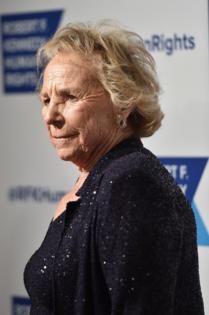Leonard Greene: The generosity and grace of Ethel Kennedy, a down-to-earth matriarch
Published in Op Eds
Joe, the congressman, was the charming one. His uncle, Ted, the senator, was the persuasive one. And Jackie, of course, was the regal one.
But if I had to pick a favorite Kennedy — and there have been a lot to choose from — it would have to be Ethel.
Of all the Kennedys who have made the news for decades and generations, Ethel Kennedy, the widow of the slain New York Sen. Robert F. Kennedy, struck me as the most down-to-earth.
Down-to-earth, of course, is a relative description of a woman who was born into a wealthy family and married into one just as prosperous and far more prominent.
But Ethel Skakel Kennedy, who died on Thursday at the age of 96, had a way of stepping outside of whatever pretensions came with American royalty.
“Ethel Kennedy was a dear friend with a passion for justice, an irrepressible spirit, and a great sense of humor,” former President Barack Obama, who awarded her the Presidential Medal of Freedom in 2014, said in a statement. “She touched the lives of countless people around the world with her generosity and grace, and was an emblem of enduring faith and hope, even in the face of unimaginable grief.”
I was honored to witness that generosity and grace firsthand.
The occasion was a 30th anniversary celebration of the famous “Ripple of Hope” speech that RFK delivered in 1966 at South Africa’s University of Cape Town.
“Each time a man stands up for an ideal, or acts to improve the lot of others, or strikes out against injustice, he sends forth a tiny ripple of hope, and crossing each other from a million different centers of energy and daring those ripples build a current which can sweep down the mightiest walls of oppression and resistance,” Kennedy said.
The Kennedy family had invited me and several other journalists on a two-week trip to South Africa to commemorate the speech.
There were visits with dignitaries — Archbishop Desmond Tutu and President Nelson Mandela — and a trip to Robben Island, where Mandela spent 18 of his 27 years locked in prison.
There was some down time — touch football with the Kennedy clan, a family tradition once preserved in black-and-white videos — and a shopping trip with Ethel Kennedy, which turned out for me to be the most stressful moment of the trip.
Somewhere between the fashion boutique and the antiques shop, I found myself alone with the matriarch of the most famous and storied family in America. No aides, no sons, no daughters. Just me and Ethel Kennedy and a bunch of antiques.
I immediately and instinctively shifted to bodyguard mode. I was no longer a journalist documenting an important trip. I was a protector of an American treasure who could not be harmed on my watch.
My protectee was unaffected by the moment. She went on about her browsing as though she and I went shopping together every week.
I was certain she would never give the moment another thought until I later received a personal, handwritten note from her telling me how much she loved “antiquing” with me.
She had a gift for the personable touch.
After a former RFK aide, Mary Jo Kopechne, drowned in Sen. Edward Kennedy’s car off Chappaquiddick Island in 1969, Ethel Kennedy wrote a letter of condolence to the Kopechne family.
The so-called Kennedy curse seemed to strike Ethel Kennedy particularly hard. More than a decade before an assassin’s bullet ended her husband’s life and presidential campaign, her parents were killed in a plane crash.
In 1984, her son David died from a drug overdose. In 1997, her son Michael died in a skiing accident.
At every heartache, Ethel Kennedy soldiered on.
“Her life has been truly remarkable,” her youngest daughter Rory once said. “In the highs and lows and even the day-to-day, she has lived intensely. You would be hard-pressed to find another like her.”
___
©2024 New York Daily News. Visit at nydailynews.com. Distributed by Tribune Content Agency, LLC.




























































Comments